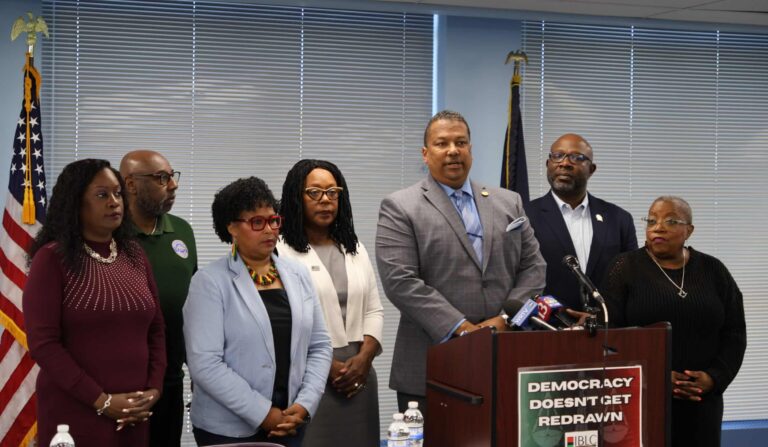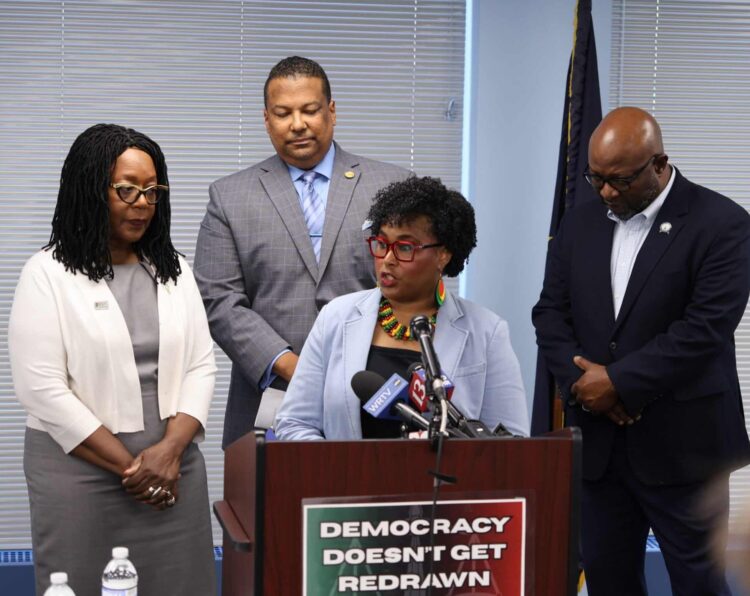
By Marilyn Odendahl
The Indiana Citizen
October 22, 2025
Even as they conceded their Republican colleagues could draw new congressional maps that would likely boot both Democrats from the state’s congressional delegation, members of the Indiana Black Legislative Caucus tried to increase the pressure on Gov. Mike Braun and GOP lawmakers to not redistrict before the November 2026 midterm election by hammering on the “real problems” facing Hoosiers.
Rep. Earl Harris Jr., chair of the IBLC, listed the issues he said legislators could address if Braun calls a special session: strengthening schools, feeding children, helping with housing concerns and cost of utilities, reducing health-care costs, making health care more available, providing child care and boosting public-health spending.
“If there is a special session, it must be for the people of Indiana, not for someone in Washington, D.C.,” Harris, D-East Chicago, said, referring to President Donald Trump, who has been personally pushing Indiana Republican legislators to redistrict. “If there’s not a special session, then let every legislative leader commit publicly and unequivocally to address these crises in 2026, when we come back as we’re scheduled (for the regular legislative session), because Hoosiers can’t wait, families can’t wait, communities can’t wait.”
The IBLC held a press conference Monday afternoon at the Julia Carson Government Center in Indianapolis to highlight their opposition to mid-decade redistricting.
State Democratic representatives and senators in the caucus expressed their concern that redrawing the congressional maps this year would disproportionately impact Black voters by splitting their communities in Lake and Marion counties into different districts and diluting their voices. Also, they noted Indiana could lose its only Black member of Congress if U.S. Rep. Andre Carson, a Democrat who represents the 7th Congressional District, which encompasses most of Indianapolis, has to run for reelection in a redrawn district that includes more suburban and rural voters.
“Redistricting isn’t just a map-making exercise,” Harris said. “It’s a power-shaping decision and when that power is manipulated, it’s communities of color (that) will pay the price in representation, in resources and in respect.”
Braun and Republican legislative leaders have been in the redistricting hot seat ever since August, when Vice President JD Vance visited the Statehouse and talked about reconfiguring the congressional districts ahead of the midterm election. Mid-decade redistricting is rare, but the Trump administration has been pressing Republican-controlled state legislatures to redraw their maps now to give an advantage to GOP candidates and prevent a blue wave in November 2026 that could give control of the U.S. House to the Democrats.
Already Republicans hold seven of the nine congressional seats apportioned to Indiana, with Carson and U.S. Democratic Rep. Frank Mrvan, from the 1st District in northwest Indiana, holding the other two seats.
Even though the arm-twisting from the White House has been increasing, Indiana Republican lawmakers have, so far, not redone the congressional boundaries. Vance made a second trip to Indiana to meet with legislators earlier this month and Indiana GOP legislators were invited by the Trump administration to the White House in late August, where redistricting was discussed. Also, Trump has reportedly called GOP representatives and senators in Indiana to personally lobby them to redistrict.
On Wednesday, Republicans cast doubt on the effort by announcing they do not have the votes in the Indiana Senate to support redistricting.
Even outside the Statehouse, the prospect of mid-decade redistricting seems to be getting little support from Hoosiers. A new poll by Independent Indiana shows a majority of Hoosier voters, in general, do not support redrawing the congressional districts this year.
The IBLC lawmakers said if the legislature does go into a special session for redistricting, the Republican supermajority will gerrymander to its advantage and essentially crack the Black vote by carving up minority communities and putting those residents in different districts.
Sen. Greg Taylor, D-Indianapolis, pointed to the city of Fort Wayne, which has the state’s third-largest minority community but is currently divided among multiple legislative districts, so several state senators now represent a piece of the Allen County capital.
“They took Fort Wayne and cut it into four sections, so that you dilute the minority vote,” Taylor said. “The Republicans have a history of being able to do this and do this in a manner that doesn’t violate Section 2 of the Voting Rights Act. So we are predicting that they will do the same thing (if they redraw the congressional districts).”
However, Braun told Wish TV’s Garrett Bergquist on Tuesday that he did not believe any voices would be diluted. “We want to make sure that what (we) end up with (will) make competitive districts across the state where everyone’s vote is represented,” the governor said.

Speaking after the news conference, Rep. Cherrish Pryor, D-Indianapolis, noted the impact gerrymandering has had on her hometown of Fort Wayne. She said the city should be represented by one state senator, and she dismissed the Republicans’ argument that the residents actually benefit because they have four legislators to champion the urban community.
“That just means that people don’t have someone that’s totally 100% focused on the needs of the people in Fort Wayne and certainly no one that is looking out for the needs of the minority community in Fort Wayne,” Pryor said. “The person that represents (the district that includes) my family, they don’t look like my family. They’re not in the community. They’re not showing up at the activities and have a vested interest in the interests of the community and the people of Fort Wayne.”
Pryor said fracturing the 7th Congressional District and splintering the 1st District would likely put pieces of those urban communities into new districts that would stretch into rural parts of the state, where residents mostly vote Republican. Representing such juxtaposed districts would be difficult, she said, because the city neighborhoods and farming towns have different challenges and concerns.
“Even though we have some of the same issues, the pharmacy deserts, the grocery store deserts, … there are a lot of differences as well,” Pryor said. “I think the key is to have representation that’s going to focus on our issues in an urban community but then partnering with someone in a rural community, so that we can address some of those issues that are the same for both of us.”
Rep. Vanessa Summers, D-Indianapolis, said if a mid-decade redistricting moves forward, “everything’s at risk” for the people who live in Indianapolis. She noted the possibility of having individuals representing parts of the city that they themselves have never lived in would be unprecedented. Saying the legislature is in “uncharted waters,” she wished she could call upon some of the late state representatives, like Bill Crawford and her father, Joseph Summers, for advice.
“If there was ever a time I could have a minute with somebody from heaven, this would be it,” Summers said.
Dwight Adams, an editor and writer based in Indianapolis, edited this article. He is a former content editor, copy editor and digital producer at The Indianapolis Star and IndyStar.com, and worked as a planner for other newspapers, including the Louisville Courier Journal.
The Indiana Citizen is a nonpartisan, nonprofit platform dedicated to increasing the number of informed and engaged Hoosier citizens. We are operated by the Indiana Citizen Education Foundation, Inc., a 501(c)(3) public charity. For questions about the story, contact Marilyn Odendahl at marilyn.odendahl@indianacitizen.org.